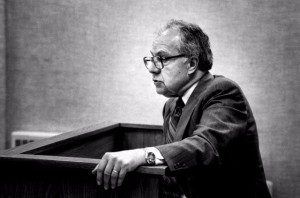Remembering Professor James Ghiardi

James D. Ghiardi, professor emeritus, passed away yesterday, at the age of 97. Jim was a Marquette lawyer, from our Class of 1942, and after service in World War II served as a member of our faculty, active or retired, for almost 70 years. From his first-year Torts course to his (somewhat) gentler approach with upper-level students, as I understand it, Professor Ghiardi was the legendary member of the Marquette Law School faculty for more than a generation. Professor Ghiardi enjoyed immense respect and esteem from Marquette lawyers—his former students.
Jim had retired by the time I arrived in 1997, but he remained a presence at the Law School until as recently as a few months ago. He was unfailingly gracious and supportive to me even before I became dean—indeed, from my earliest days on the faculty. I have been fortunate to count him among my colleagues and friends. At the same time, it seems appropriate to let speak here one of my predecessors as dean—indeed, one of Professor Ghiardi’s former students. Robert F. Boden wrote the following of Professor Ghiardi in 1971:
I first knew him when I was one of 160 terrified freshmen students entering Law School in the fall of 1949. As a student I came to respect him as a fine teacher. As a fellow member of the bar, a fellow Marquette alumnus, faculty colleague, and finally as his Dean, I have come to respect him as a gentleman and a scholar. Few are more zealous in their loyalty to the University and to the profession. Few also have the industry and capacity for work that manifests itself every day in Professor Ghiardi’s vigorous and devoted attention to the responsibilities which he has assumed in the Law School and in the many other related activities which he has undertaken.
In a quarter century of teaching of tort and insurance law, Professor Ghiardi has come to be recognized nationally as one of the academic leaders in this area of the law. Since 1962 he has served as Research Director of the Defense Research Institute, the national research and educational arm of the defense bar. He is often called upon to address legal organizations throughout the country in the field of his expertise, and his long record of publication in the leading bar journals of the country is a further manifestation of his accomplishments in legal scholarship.
Dean Boden made these remarks in the context of dedicating, on behalf of the student editors, a volume of the Marquette Law Review to Professor Ghiardi. The dedication, which also notes Professor Ghiardi’s unusual service as the president of the Wisconsin bar, may be read here.
It concludes by expressing “certain[ty] in the fact that [Professor Ghiardi] will continue for many more years to reflect the highest ideals of his University and his profession.” Dean Boden was right to be so certain in his remarks nearly forty-five years ago. The loss of Jim Ghiardi now diminishes us, but his work and life magnified us—and as a legacy will continue to do so. Requiescat in pace.
Visitation will be held on Sunday, January 24th at Feerick Funeral Home, from 2:00 to 4:00 PM. A visitation will also be held starting at 9:30 AM on Monday, January 25th, followed by the celebration of the Mass of Christian Burial at the Church of the Gesu, 1145 W. Wisconsin Ave. at 10:30 AM. Committal Services and Military Honors will take place at Holy Cross Cemetery, 7301 W. Nash, after the Mass. A lunch will follow at 1:30 PM at the Italian Community Center, 631 E. Chicago Ave.
Memorials in Jim’s name may be made to the Marquette University Law School, (James D. Ghiardi and Phyllis A. Ghiardi Scholarship Fund), or to the Milwaukee Catholic Home (Employee Fund).


